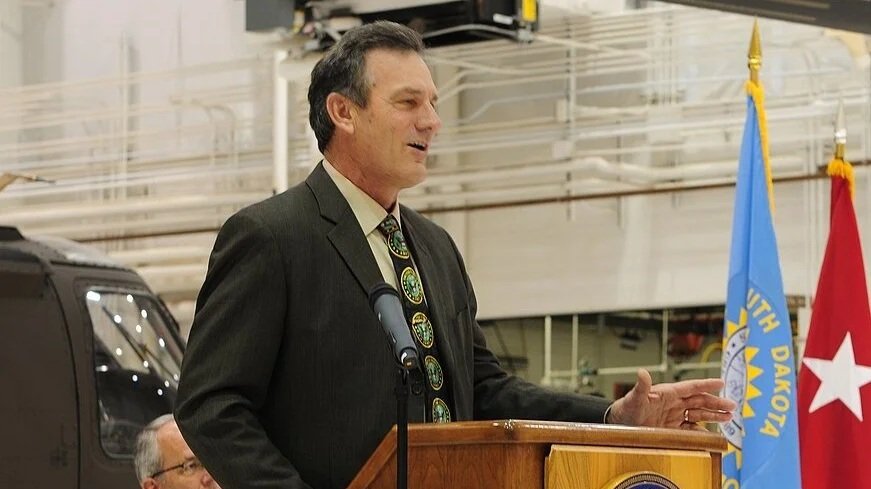Larry Rhoden would be the third S.D. lieutenant governor to move up. The first two did not remain in their new office
Barring any unexpected problems with Gov. Kristi Noem’s confirmation as director of Homeland Security, Larry Rhoden (seen above) will be South Dakota’s governor very soon. Kristi is riding high as she plans a return to Washington, D.C., leaving Pierre far behind.
Rhoden is in his sixth year as lieutenant governor and has experience in both the state Senate and House of Representatives. He won’t be taking office without a lot of experience with the process of running state government.
Expect more of the same, since like Noem, he is a conservative Republican who will work with a Legislature where Republicans hold supermajorities in both chambers.
Rhoden, 64, has kept a fairly low profile since he took office as Noem’s No. 2 in 2019. She is an expert at seizing the spotlight, so he has been largely anonymous. That’s not uncommon for lieutenant governors or vice presidents, of course.
He was seen as a possible candidate for the Republican nomination for governor in 2026, with Sen. Mike Rounds, a former two-term governor, Rep. Dusty Johnson, who served as a chief of staff to Gov. Dennis Daugaard, and Attorney General Marty Jackley also vying for the GOP nod.
This promotion moves Rhoden ahead on the political chessboard. If he runs in 2026, it’s as Gov. Rhoden. That is surely a positive, unless things go seriously awry in Pierre in the next two years.
But it doesn’t mean he is assured of winning a full term for himself. Rhoden would be the third lieutenant governor to move into the governor’s office, but neither of the other two were able to even claim their party’s nomination in the next election.
In 1974, Gov. Dick Kneip was in the middle of a historic third consecutive term. Kneip was elected to two-year terms in 1970 and 1972. He sought a third term in 1974, after a revision of state government he had led changed the term to four years.
The South Dakota Supreme Court ruled in his favor, allowing Kneip to run again. His lieutenant governor, longtime Democratic political operative Bill Dougherty, had planned to run for governor in 1974, and he refused to wait until 1978.
Dougherty challenged Kneip in the Democratic Primary and was soundly drubbed. He never ran for office again.
Kneip selected state Sen. Harvey Wollman as his new running mate. They won — and that was last time Democrats were elected governor and lieutenant governor.
As happened with President-elect Donald Trump and Noem, a presidential appointment created a major change in South Dakota government.
In 1978, Kneip was tapped by President Jimmy Carter to serve as ambassador to Singapore. He was set to depart in July.
Before then, however, Wollman faced a primary challenge from state Sen. Roger McKellips of Alcester. In a surprise, McKellips won the June 8 election.
That meant when Wollman took office on July 24, he was already a lame duck. He was the shortest-serving governor in state history — and the last Democratic governor. Not forever, although you have to wonder if and when a Democrat can win again in this increasingly red state.
McKellips lost to Attorney General Bill Janklow, the first of four victories for Janklow, who served as a governor from 1979-87 and again from 1995-2003. Wollman always wondered how he might have done against Janklow, telling people, including me, that Janklow told him he was a much tougher challenge than McKellips.
Janklow served four terms as governor and was elected to Congress in 2002 and 2004 before he caused a fatal crash on Aug. 16, 2003, and was forced to resign in January after a Moody County jury found him guilty of second-degree manslaughter, a felony, as well as speeding, running a stop sign and reckless driving, all misdemeanors.
McKellips returned to the state Senate, although he never again sought statewide office. Wollman made another run for a legislative seat but never lost and retired from politics.
Walter Dale Miller was the other lieutenant governor to lose the first word in his title, and he did so in a tragic manner.
George S. Mickelson, a popular Republican from Brookings, was in his second term as governor when he and seven other men were killed in a plane crash near Dubuque, Iowa, on the way home from a meeting with John Morrell officials in Cincinnati. April 19, 1993, was a truly dark and trying day for the state, and Miller was forced to take the reins of state government at a painful time.
Mickelson is the only South Dakota governor to die in office.
Miller, who operated a ranch by New Underwood, decided to run for governor in 1994, but once again, Janklow was in the campaign. He had decided to make a bid for his old job, and engaged in a lively battle with Miller for the Republican nomination.
Janklow won, and Miller never ran for office again. Janklow swept past Democratic candidate Jim Beddow to return to the governor’s office.
The past is sometimes prologue, but not always. New stories are written and fresh history made.
Will Rhoden run for governor? Will he face a primary opponent, or will Rounds and Johnson remain in Congress? What does Jackley, who ran against Noem for the GOP gubernatorial nomination in 2018, do now?
There are many questions surrounding the 2026 gubernatorial race, including who the Democrats will find to run and try to snap their long losing streak. But first, it’s up to Rhoden to show the state what he can do once he takes the reins.
Fourth-generation South Dakotan Tom Lawrence has written for several newspapers and websites in South Dakota and other states for four decades. He has contributed to The New York Times, NPR, The London Telegraph, The Daily Beast and other media outlets. Do not republish without permission.
Photo: public domain, wikimedia commons







